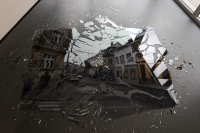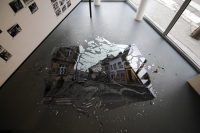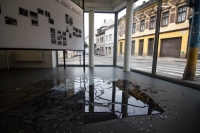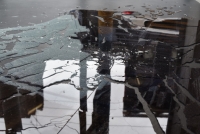Skrytá hra práva / Playing Hide and Law
Vizuálne rozpletanie latentnej moci zákona / A Visual Unraveling of the Latent Power of Law
Kurátor | Curator: Avi Feldman
11.3. 2017 – 13.5. 2017 - tranzit.sk / Bratislava
Tlačová správa
Dalibor Bača vo svojej práci vyjadruje vlastný nejednoznačný postoj ku vzťahu medzi právnym
systémom a svetom umenia a pochybnosti o možnostiach umeleckých inštitúcií zapojiť sa do
konštruktívneho boja za sociálnu a právnu spravodlivosť. Ako východisko svojej práce Táto
krajina nie je pre teba (2017), ktorú vytvoril pre túto výstavu, si preto vybral obraz ulice
zachytenej cez okno tranzit.sk. Vo svetle politickej a právnej korupcie na Slovensku si Bača
kladieotázku, či je nová interpretácia zákona a jeho obrazu vôbec možná, keď sú tak hlboko
zapustené do sociálnych štruktúr. Uvažujúc o role, ktorú právo zohráva v spoločnosti,
prichádza Bača s názorom, že treba začať odpútaním sa od bezprostredného vnímania toho,
čo vytvára „naše ulice“, „naše mesto“ a „našu krajinu“. Pracujúc so všedným a bezprostredným
obrazom okolia tranzit.sk podnecuje fyzickú a emocionálnu reakciu brutálnym rozbitím obrazu.
V kontexte výstavy provokuje deštrukcia známeho, toho, čo považujeme za samozrejmé,
keďže nás núti predstaviť si nové alternatívne verzie sociálnych konštrukcií – od zákona,
cez politiku až k ekonomike.
Artist Dalibor Bača links his personal ambivalence towardsthe relation between the legal system
and the art world at the heart of his work. He doubts the possibility of art institutions to take part
in a constructive struggle for social and legal justice. Hence, for his work Táto krajina nie je pre
teba (This Country Is Not For You, 2017), created especially for the exhibition, he chooses as a
starting point an image of the street as seen through the tranzit.sk’s windows. In light of political
and legal corruption in Slovakia, Bača questions whether a new interpretation of the law and its
image is even possible when it is deeply embedded in all social structures. When approaching
the role of law in society, Bača argues that one should begin by breaking away from the immediate
perception of what makes ‘our streets’, ‘our city’, and ‘our country.’ Using a mundane, immediate
image of the local environment in which tranzit is situated, the artist ignites a physical and
emotional reaction through the brutal shattering of an image. In the context of the exhibition,
the destruction of the known, of that which is taken for granted, is also a provocation of the mind
as it insists that we re-imagine new alternative compositions for all social constructions – from law,
to politics to the economy.



